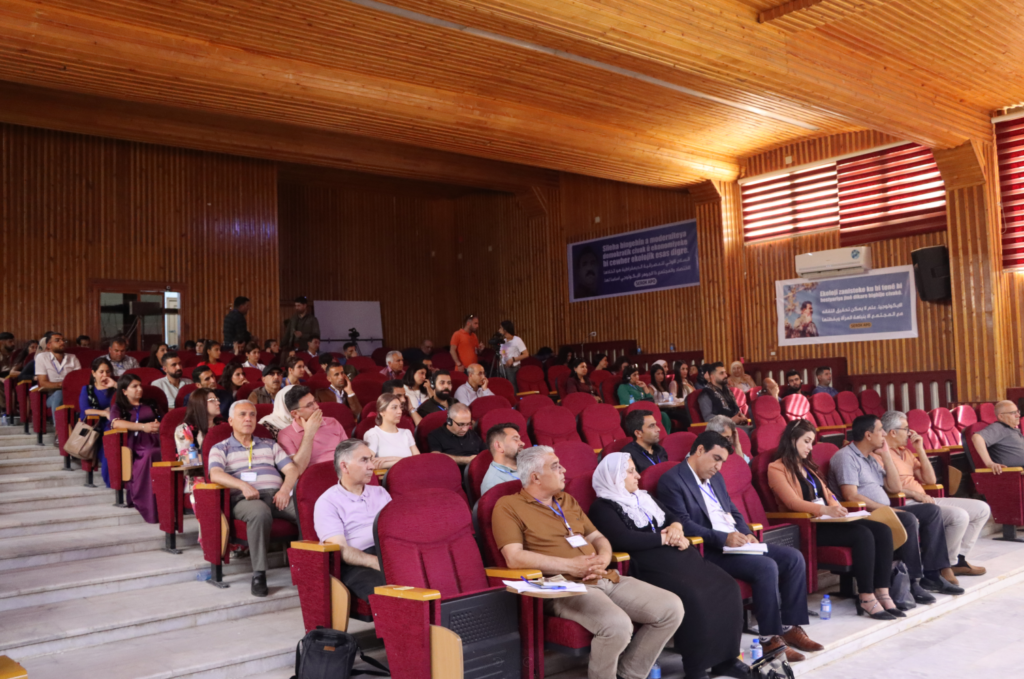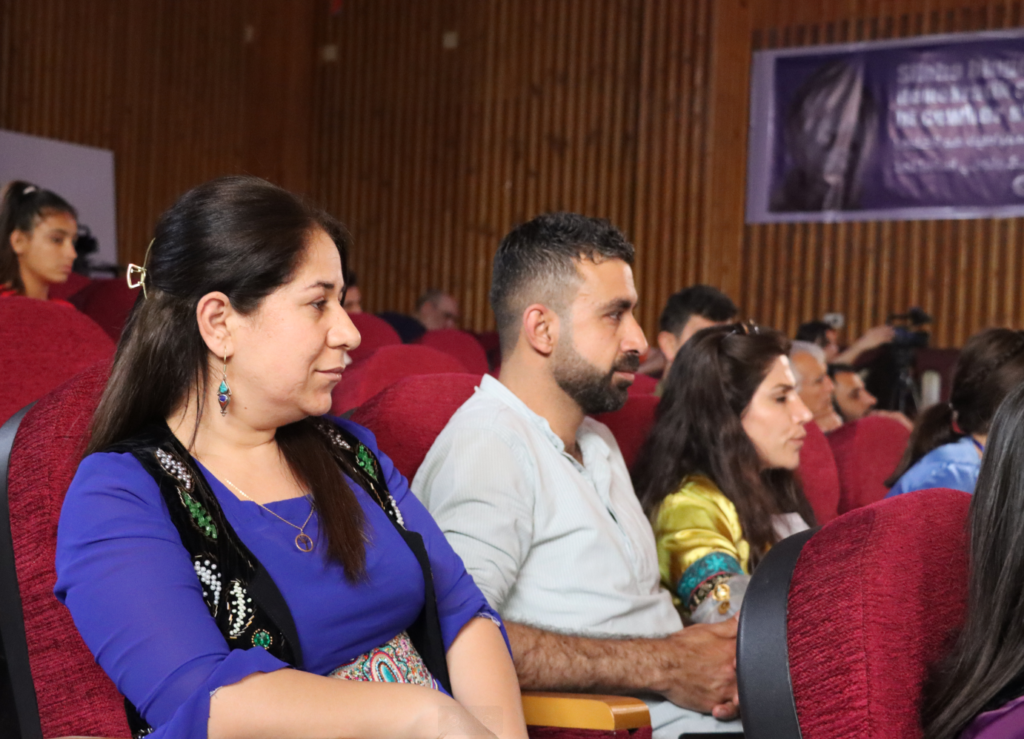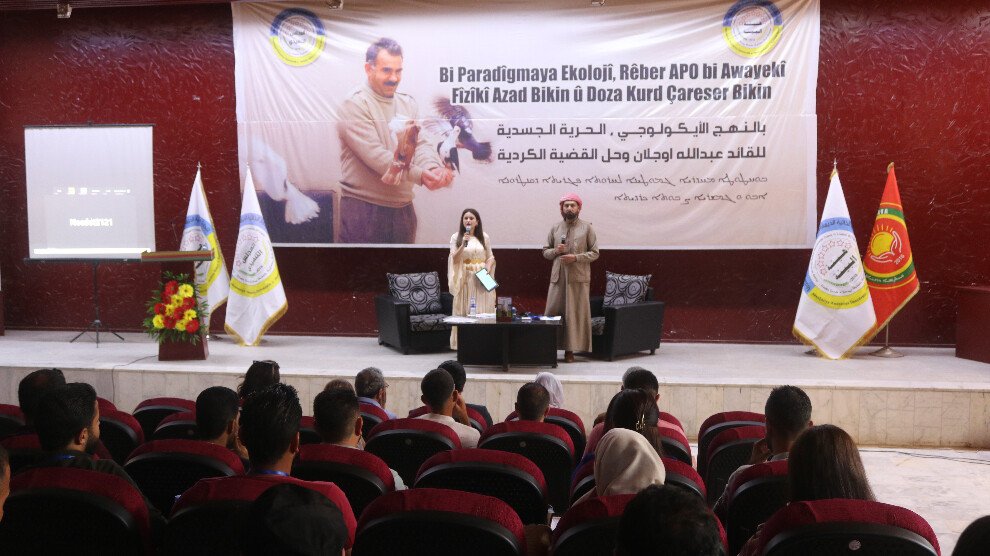A new step toward the ecological revolution
“Ecology and society cannot be understood separated from each other. How can we build a relation with nature if we don’t build a relation with the person next to us ?”
“Abdullah Öcalan researched the root of domination of Nature and on this basis propose a paradigm where ecology has a central role. His struggle for the protection of nature and for an ecological society have been an example not just for the Kurdish people but for people all around the world. Looking at the situation of Abdullah Öcalan, if the most radical defender of nature has been kidnapped, put in prison, in isolation, since 25 years, what can we say about the situation of Nature?”
“Ecology and women’s freedom are intrinsically connected. With the Rojava revolution the struggle for women’s liberation has made many steps forward. Ecology has not reached the same point, this is why we have to work even more to progress on this filed.”
These are some of the thoughts that were shared during the first ecological conference held by the Ecological Council of the Democratic Autonomous Administration of North-East Syria. On 26th and 27th of April we participated in the conference, which was held under the slogan “Freeing the leader Apo through the ecological paradigm and solving the Kurdish question”. It was focused especially on the application of the paradigm of Democratic Conferderalism in the field of Ecology. The participants shared thoughts and discussed together about how to develop an ecological mentality and practice in the framework of Democratic modernity, in North-East Syria and beyond.

Researchers, academics and activists from all over the world joined the conference (South-Africa, India, Mexico, Europe) sharing their researches, experiences local struggle, pf ecological resistance. These experiences showed once again that solutions for the ecological problems can not be found within the state system. In a lot of cases, after ecological parties or activists entered the institution or the state, instead of pursuing their ecological goals, they play a part in oppressing grassroots and indigenous ecological ecological movements.
Many topics were mentioned and the discussions about the relations between ecology, economy, and health were very participated, with interventions and questions. The topic of agriculture in particular caught the interest of the participants. Agriculture is among the most affected filed by ecological damages but at the same time it can play a central role in the process toward a socio-ecological society. The relation of the people with their land is the basis for the protection of Nature and social resistance. Agricultural cooperatives combine a social economy for the communities and the production of healthy food for them.
Gea Piccardi, researcher spoke about the relation between women’s freedom and ecology. Understanding this relation can allow us to struggle in a more radical way against the dominant system and for a free life. Piccardi showed how the ecological thought of Abdullah Öcalan was influenced not only by the theories of Murray Bookchin about social-ecology and municipalism but from the ideas of the eco-feminist Maria Mies about the relation between oppression of nature and women, about the knowledge of women. In this framework, Piccardi also spoke about Jineoloji, the science of women and of life, developed by the Kurdish freedom movement. Jineoloji, with its approach and methods of research, represents a revolutionary way to struggle for a free life and a democratic society. Against the attacks of positivism, Jineoloji proposes to recover the relation between women and Nature as basis for the re-establishment of relations free from domination.
Dr. Davide Grasso from Italy who joined the conference via zoom applied the method of Abdullah Öcalan on the problem of technology and its influence on the nature. He stated that technique was something that humans always applied for their survival without destroying the balance between them and the nature, but that the since the use of technique was put under the dictate of profit, it started to damage this balance heavily and led to the severe environmental crisis that we face today.
For North-East Syria a reorganization of the ecological works is in progress. The works that have been made from the beginning of the revolution until now have been evaluated with self-criticism. It was stated that in the fields of women’s liberation, which is one of the essential parts of the democratic conferderalist paradigm steps have been made, while for ecology, which is of the same importance, not enough effort has been made.

The conference led to the decision that the ecological work needed to be re-organized. Therefore, it was decided that specific ecological institutions will be build in order to progress in the ecological work. At the same time all the institutions will be responsible for the development and implementation of the ecological paradigm. From the neighbor’s commune to the education, health and economy committee. Nature and the health of the land are basis for the life, this is why this new structure is based on the idea that everyone needs to feel responsible for ecology, not just one specific department. This system, in accord to the view of the new Social Contract, pursues the dialectic line of decentralization and professionalization.
The Conference concluded with a Declaration and the will of all the institutions and guests to strengthen the collaboration and relation between democratic forces and struggles all over the world. For an ecological society we have to start from our society, organizing ourselves on ecological principles against individualism, green capitalism, patriarchy and State-system. Only in this way we could put in practice the philosophy of Abdullah Öcalan and struggle for his physical freedom.


